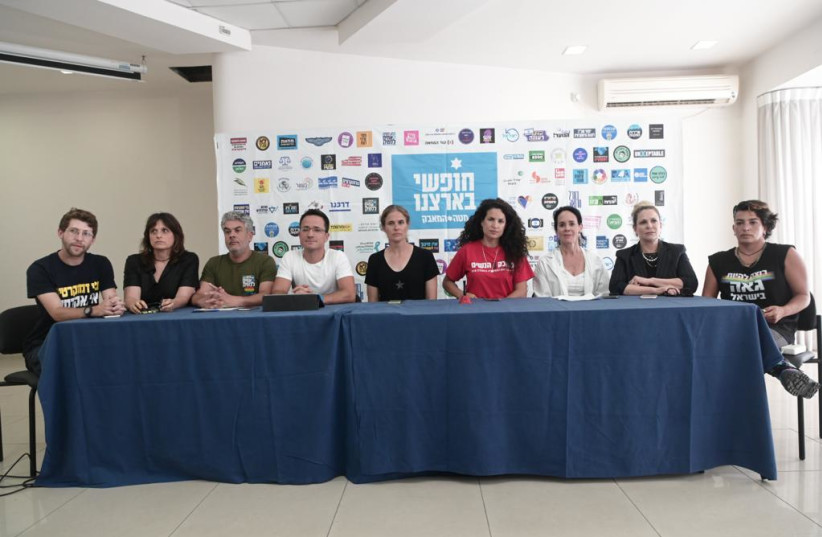The liberal and anti-reform protestors will hold mass protests on Tuesday if the coalition's bill to cancel the Reasonableness Standard passes its first reading in the Knesset plenum on Monday, a group of protest leaders sat in a joint press conference on Thursday afternoon.
The protest leaders called on all of Israel's citizens to take a vacation day on Tuesday if the bill passes, and to demonstrate, "legally but determinedly," in the streets, squares, and outside of government institutions. The leaders also called on employers and senior figures in the economy to support workers who wish to demonstrate, and even shut down workplaces, since "if the legislation passes, Israel is on a clear path to become a zealous and extremist dictatorship."
Prominent protest leader Prof. Shikma Bressler also addressed a call by National Unity party chairman MK Benny Gantz to return to the talks at the President's Residence. "There will be no return to talks without the complete cancellation of the dictatorial laws," Bressler said. She added that "while we understand the wish to reach compromise, we must remind everyone that compromise in and of itself is not a value, and there should be no compromise on values such as freedom and equality."
Prof. Idit Matot, an anesthesiologist and a leader in the doctors' protest movement, tore her blouse, which is a Jewish symbol of mourning, and called all doctors to do the same to symbolize the schism in the nation. She warned that an independent judiciary was essential in ensuring a strong public health system, and added that the majority of doctors were not willing to move abroad if Israel's health system falters – and will fight to safeguard it.
Asked by a reporter about the inconvenience the protests were causing to drivers, especially on the Ayalon Highway, hi-tech protest leader Moshe Radman said that the protestors were trying to do as little damage as possible, and that he and the other protestors were acting on behalf of drivers stuck in traffic jams as well.

"In a democracy, sometimes you must violate some people's rights, so that everyone will not lose many of their rights," he added.
Protesters demonstrate in front of politicians' homes
Protesters demonstrated in front of the homes of a number MKs and ministers on Thursday afternoon, including MK Boaz Bismuth, Education Minister Yoav Kisch, Innovation, Science, and Technology Minister Ofir Akunis, Diaspora Affairs Minister Amichai Chikli, Intelligence Minister Gila Gamliel, Knesset Speaker Amir Ohana, Agriculture Minister Avi Dichter, Defense Minister Yoav Gallant, and Health Minister Moshe Arbel.
Protest leaders comment
Other than Bressler, Matot, and Radman, speakers included Yaron Kremer from the Brothers in Arms reservists movement; Moran Zer Katsenstein, leader of women's protest group "Bonot Altervativa" (Building an Alternative); lawyer Noga Rubinstein of the Black Robes protest group; Nadav Salzberg of the students' protest group; Sivan Shamri Dahan, the Co-founder and Managing Partner at Qumra Capital; and Hila Pe'er, CEO of the LGBT Association.
The reasonableness standard is a common law doctrine that allows for judicial review against government administrative decisions that are deemed beyond the scope of what a responsible and reasonable authority would undertake.
Critics of the law argue that it is a highly subjective tool for judicial activism that allows the court to subvert government policy with its own views. Proponents argue that the tool is one of the few in the Israeli court’s toolbox, and is essential to counter corruption and to ensure the protection of individuals from arbitrary and capricious government decisions.
The court used the reasonableness standard, for example, when it ruled in January that Prime Minister Benjamin Netanyahu's decision to appoint Shas chairman Aryeh Deri to two ministerial positions, despite three criminal convictions on white-collar crime committed while in power, suffered from "extreme unreasonableness."
Michael Starr contributed to this report
